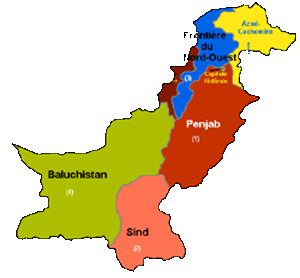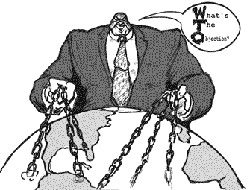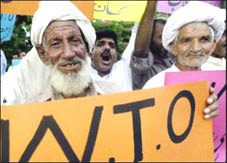WTO - role of the provinces
ARTICLE First, a few words on the bed linen
anti-dumping duty imposed by EU. The industry is
blaming the government for mishandling the case.

This is an unsustainable allegation. I have
handled and observed the defence of more
anti-dumping investigations in Pakistan than any
other individual and have no hesitation in saying
that the Ministry of Commerce did all that could
be expected of it. The industry mishandled the
case from day one.
The recently held Press conference by some
industry elite threatening to cancel purchase
orders from Europe was tactless and
counter-productive. Unfortunately a public
analysis of the case is not in the best interest
of all involved. I do, however, have some
comments/suggestions:
1) Pakistan must go through dispute settlement
proceeding and should do it expeditiously. There
is no point in writing letters here and there, as
is being reported in the Press.
The required legal sequence must start
immediately. Our Deputy Minister at Geneva, Nasim
Qureshi, has the experience of US combed cotton
yarn safeguard case (against US), which Pakistan
won. He can co-ordinate this case also.

2) In May, 10 more countries will be joining EU. I
believe that the proposed AD duty cannot be
imposed by the 10 new members of EU, as the
domestic industry of these 10 countries was not
part of investigation.
3) As per panel decision in India-Turkey case, the
ten new entrants to EU cannot impose textile quota
on Pakistan unless a mutually acceptable bilateral
agreement is reached as was done by Pakistan and
Turkey.
4) EU's attempt to start anti-dumping proceedings
against the Indian bed linen was thwarted as India
took EU to WTO and the dispute settlement panel
upheld India's view.
The Pakistan industry/government should review
that case. We should also have a "talking
relationship" with Indian counterparts to be able
to discuss issues of mutual interest. I had
established such a relationship when I was
handling cases on behalf of Pakistan and found it
beneficial.
NOW, TO THE MAIN SUBJECT:
With the devolution of power initiative started by
the Musharraf government, the role of different
levels of government is going through a process of
evolutionary change.
The provincial governments need to review their
role in the new scheme of things. It appears that
while on some issues their role will diminish,
handing over the responsibility to CDG's, on
certain other issues the role of provincial
governments will increase.

The industry in Pakistan, in general has very
little interaction with the provincial
governments. It mostly looks towards the federal
government for policy guidance, regulatory issues,
investment, facilitation etc.
The role of the provincial governments, as far as
the industry is concerned is mostly restricted to
collecting levies, like social security, and on
some other labour laws-related issues. The
provincial government is seen as a regulator and
not as a facilitator.
The federal ministries in Pakistan, like Commerce,
Finance, Industries etc, operate with certain
targets.
The entire nation is aware of the targets like GDP
growth, fiscal deficits, foreign exchange reserves
etc.
So far, these targets on provincial levels do not
exist and the performance of the provinces is not
measured on such issues.
Thus, while we are aware of GDP growth or export
achievement on a national level, we are totally
unaware of the performance of the provinces.
Such lack of performance criterion makes it
impossible to compare the performance of different
provinces, thereby eliminating the chances of a
healthy competition between the provinces.

This kind of competition plays an important rote
in the development of other countries.
Increasing importance of WTO for our economy has
attracted the attention of our provincial
leadership.
The Chief Minister of Punjab, Chaudhry Pervaiz
Elahi, is known to be paying special attention to
WTO-related issues.
Following his directive, cells and committees have
been created in various provincial
departments/ministries to study WTO related issues
arid to recommend steps, that need to be taken by
the provincial governments.
This article examines the issues facing these
committees and presents some observations and
suggestions.
1. At present the provincial committees appear to
be consciously trying to divide the WTO issues
between federal and provincial issues and then try
to move away from the federal issues.
This is a self-defeating approach. For the purpose
of research, study, understanding and developing
recommendations it is not possible to separate
federal and provincial subjects.
The separation should occur only when and if
executive orders are to be issued.
2. Relationship between various provincial
committees working on WTO-related subjects, and
the federal Ministry of Commerce should develop to
the extent that the provincial committees should
be able to provide valuable inputs to the WTO Cell
of the Ministry of Commerce.
The provincial committees should raise the level
of their knowledge and expertise in matters
related to the WTO. For this purpose the
provincial resources should be developed and level
of dependence on Islamabad should be decreased.
The name of the game under the WTO regime is
competitiveness and compliance. The provincial
authorities need to develop expertise to analyse
and quantify competitiveness and compliance.
This effort can only be undertaken under a strong
public-private partnership.
3. The provincial Planning and Development
department should develop a "vision" and should
outline provincial targets.
The provinces need to develop the expertise in
managing a post-WTO economy. While the federal
agencies have developed several "visions" and
planning documents, the provinces need to break up
these visions into "provincial visions."
4. The provinces should adopt the role of
facilitator on the issues considered federal
subject.

The provinces should encourage the industry to
contact provincial ministries and should intercede
with the federal authorities on behalf of the
industry located in their province.
5. The environment-related issues are going to
become of major concern on WTO front. There is
great divergence of opinion over the degree to
which environmental issues belong to the WTO
regime.
However, whether these issues are WTO-driven or
consumer-driven, we should get ready to face these
issues.
The industry often complains about the cost of
compliance, eg setting up of effluent treatment
and waste disposal facilities.
These facilities should be considered part of the
infrastructure that the government should provide
to the industry.
6. Paradigm of provincial government toward the
private sector, especially the industrial sector,
needs to undergo a major change.
The provinces should self-impose investment, GPP
(Gross Provincial Product) growth and employment
growth targets.
The provincial ministries should see themselves as
facilitator and act as a tunnel for attracting
Federal inputs for the benefits of provincial
stakeholders. When it comes to WTO, the name of
the game is competitiveness. Each province and its
administration should wage its own war to increase
the competitiveness of the industry located in it.
The provincial administration should inculcate the
feeling in the mind of the industry that increased
interaction with the provincial ministries will
benefit the industry and expedite solution of its
problems.
7. The Provincial Committee on Investment (PCOI),
traditionally a dormant institution, should be
activated and asked to play a proactive role.
Competitiveness can only be achieved through
efficient governance.
The provinces should plead the case of its
industry for achieving good governance.
AKBER SHEIKH
Courtesy Business Recorder
|